A Study of Business Ethics and Practices at Hutong Enterprises
VerifiedAdded on 2023/06/05
|12
|3425
|113
Essay
AI Summary
This essay provides a detailed analysis of the business ethics of Hutong Enterprises, examining the discrepancies between the company's espoused values and its actions. It explores the challenges faced by the company, including issues related to employee relations, the impact of the 'tiger' culture, and the ethical implications of its practices. The essay highlights contradictions in the company's approach to corporate social responsibility and employee welfare. It also discusses the challenges of maintaining ethical standards in a global business environment and provides recommendations for the CEO and union leaders on future approaches to address these issues. The analysis covers key areas like the Labor Contract Law of 2005, the 'mattress culture,' and the theory of Virtue Ethics and Utilitarianism, offering insights into the impact of these factors on the organization and its stakeholders. The essay emphasizes the importance of ethical guidelines and the need for companies to align their actions with their core values to ensure sustainable business practices.
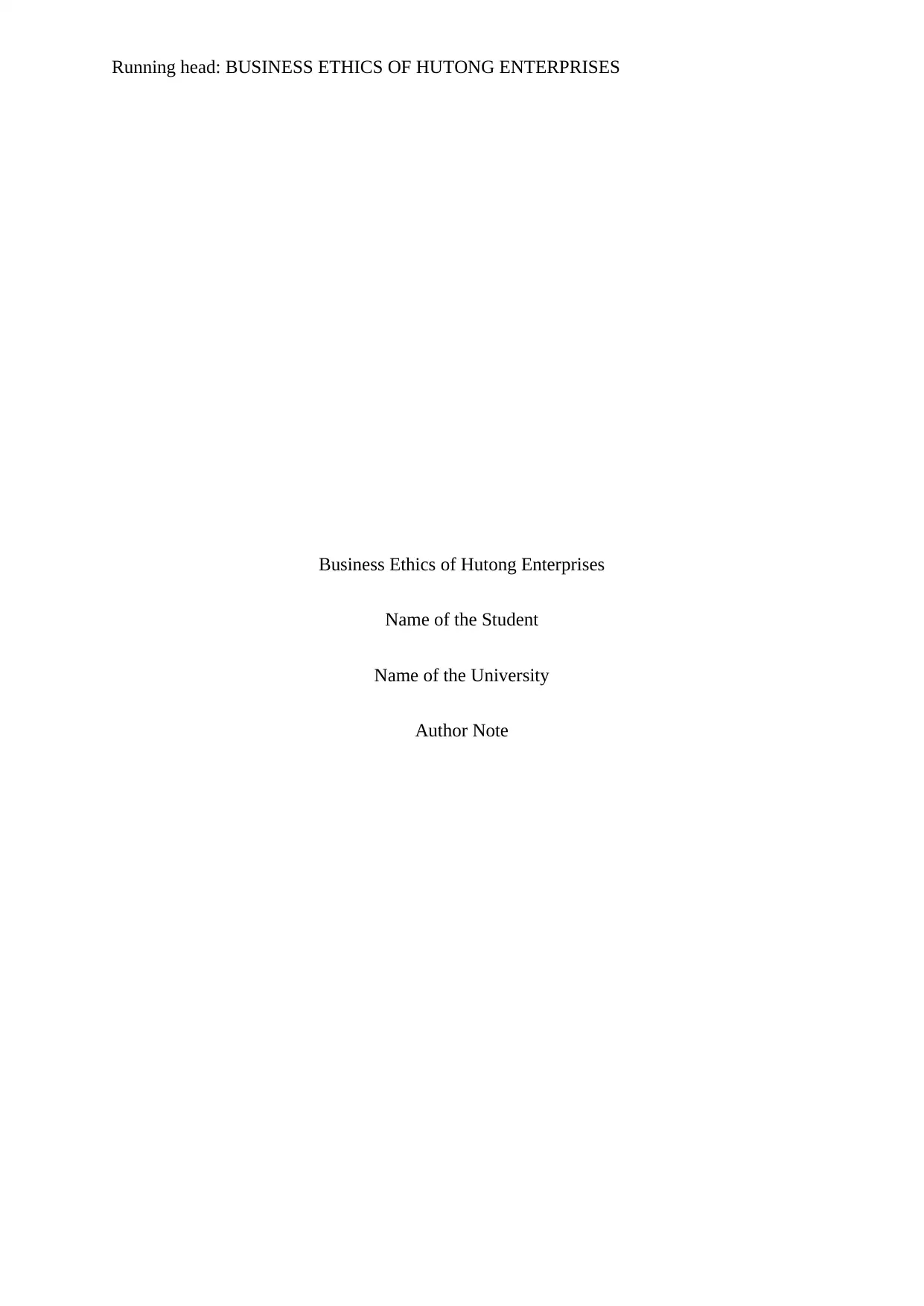
Running head: BUSINESS ETHICS OF HUTONG ENTERPRISES
Business Ethics of Hutong Enterprises
Name of the Student
Name of the University
Author Note
Business Ethics of Hutong Enterprises
Name of the Student
Name of the University
Author Note
Paraphrase This Document
Need a fresh take? Get an instant paraphrase of this document with our AI Paraphraser
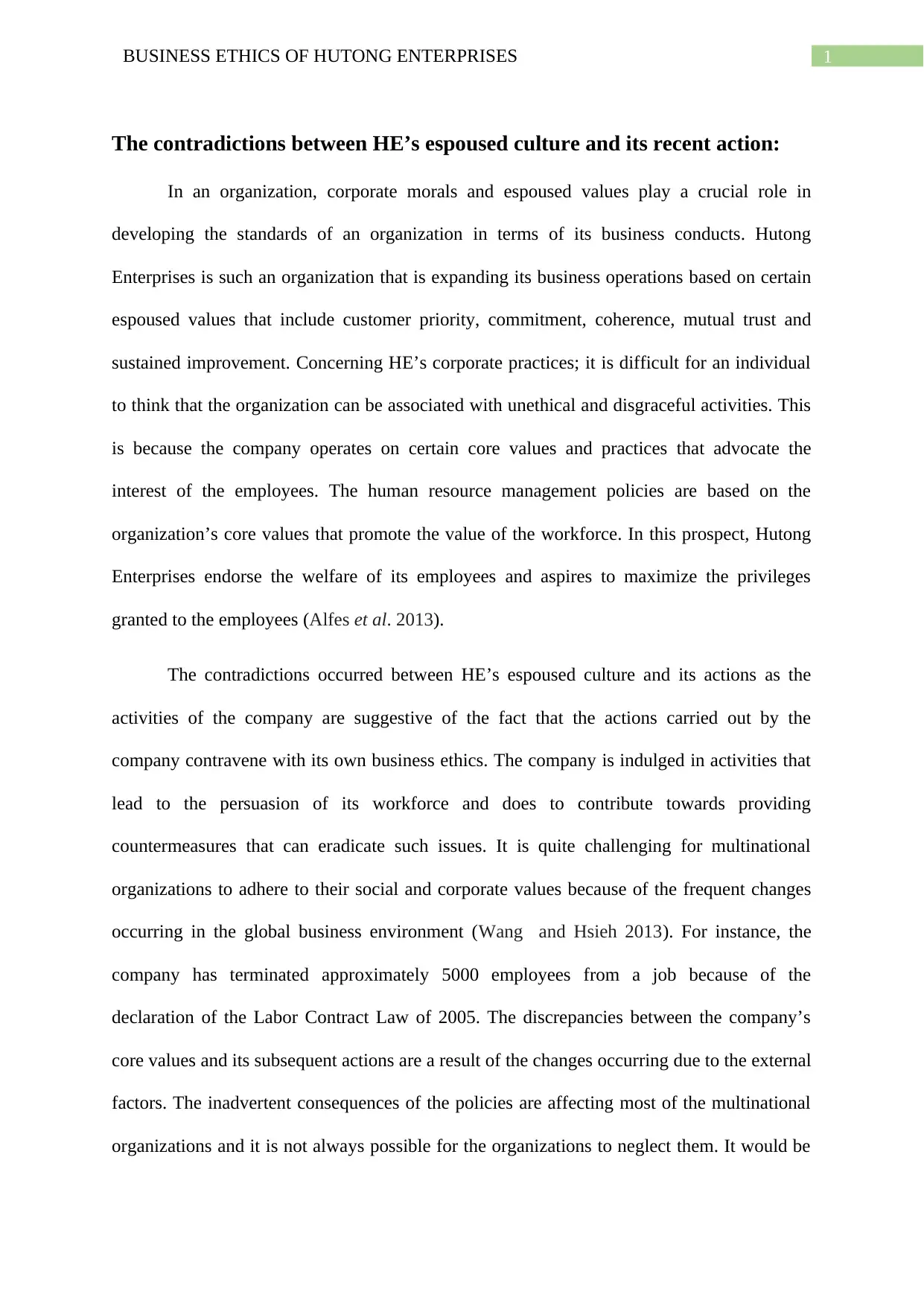
1BUSINESS ETHICS OF HUTONG ENTERPRISES
The contradictions between HE’s espoused culture and its recent action:
In an organization, corporate morals and espoused values play a crucial role in
developing the standards of an organization in terms of its business conducts. Hutong
Enterprises is such an organization that is expanding its business operations based on certain
espoused values that include customer priority, commitment, coherence, mutual trust and
sustained improvement. Concerning HE’s corporate practices; it is difficult for an individual
to think that the organization can be associated with unethical and disgraceful activities. This
is because the company operates on certain core values and practices that advocate the
interest of the employees. The human resource management policies are based on the
organization’s core values that promote the value of the workforce. In this prospect, Hutong
Enterprises endorse the welfare of its employees and aspires to maximize the privileges
granted to the employees (Alfes et al. 2013).
The contradictions occurred between HE’s espoused culture and its actions as the
activities of the company are suggestive of the fact that the actions carried out by the
company contravene with its own business ethics. The company is indulged in activities that
lead to the persuasion of its workforce and does to contribute towards providing
countermeasures that can eradicate such issues. It is quite challenging for multinational
organizations to adhere to their social and corporate values because of the frequent changes
occurring in the global business environment (Wang and Hsieh 2013). For instance, the
company has terminated approximately 5000 employees from a job because of the
declaration of the Labor Contract Law of 2005. The discrepancies between the company’s
core values and its subsequent actions are a result of the changes occurring due to the external
factors. The inadvertent consequences of the policies are affecting most of the multinational
organizations and it is not always possible for the organizations to neglect them. It would be
The contradictions between HE’s espoused culture and its recent action:
In an organization, corporate morals and espoused values play a crucial role in
developing the standards of an organization in terms of its business conducts. Hutong
Enterprises is such an organization that is expanding its business operations based on certain
espoused values that include customer priority, commitment, coherence, mutual trust and
sustained improvement. Concerning HE’s corporate practices; it is difficult for an individual
to think that the organization can be associated with unethical and disgraceful activities. This
is because the company operates on certain core values and practices that advocate the
interest of the employees. The human resource management policies are based on the
organization’s core values that promote the value of the workforce. In this prospect, Hutong
Enterprises endorse the welfare of its employees and aspires to maximize the privileges
granted to the employees (Alfes et al. 2013).
The contradictions occurred between HE’s espoused culture and its actions as the
activities of the company are suggestive of the fact that the actions carried out by the
company contravene with its own business ethics. The company is indulged in activities that
lead to the persuasion of its workforce and does to contribute towards providing
countermeasures that can eradicate such issues. It is quite challenging for multinational
organizations to adhere to their social and corporate values because of the frequent changes
occurring in the global business environment (Wang and Hsieh 2013). For instance, the
company has terminated approximately 5000 employees from a job because of the
declaration of the Labor Contract Law of 2005. The discrepancies between the company’s
core values and its subsequent actions are a result of the changes occurring due to the external
factors. The inadvertent consequences of the policies are affecting most of the multinational
organizations and it is not always possible for the organizations to neglect them. It would be
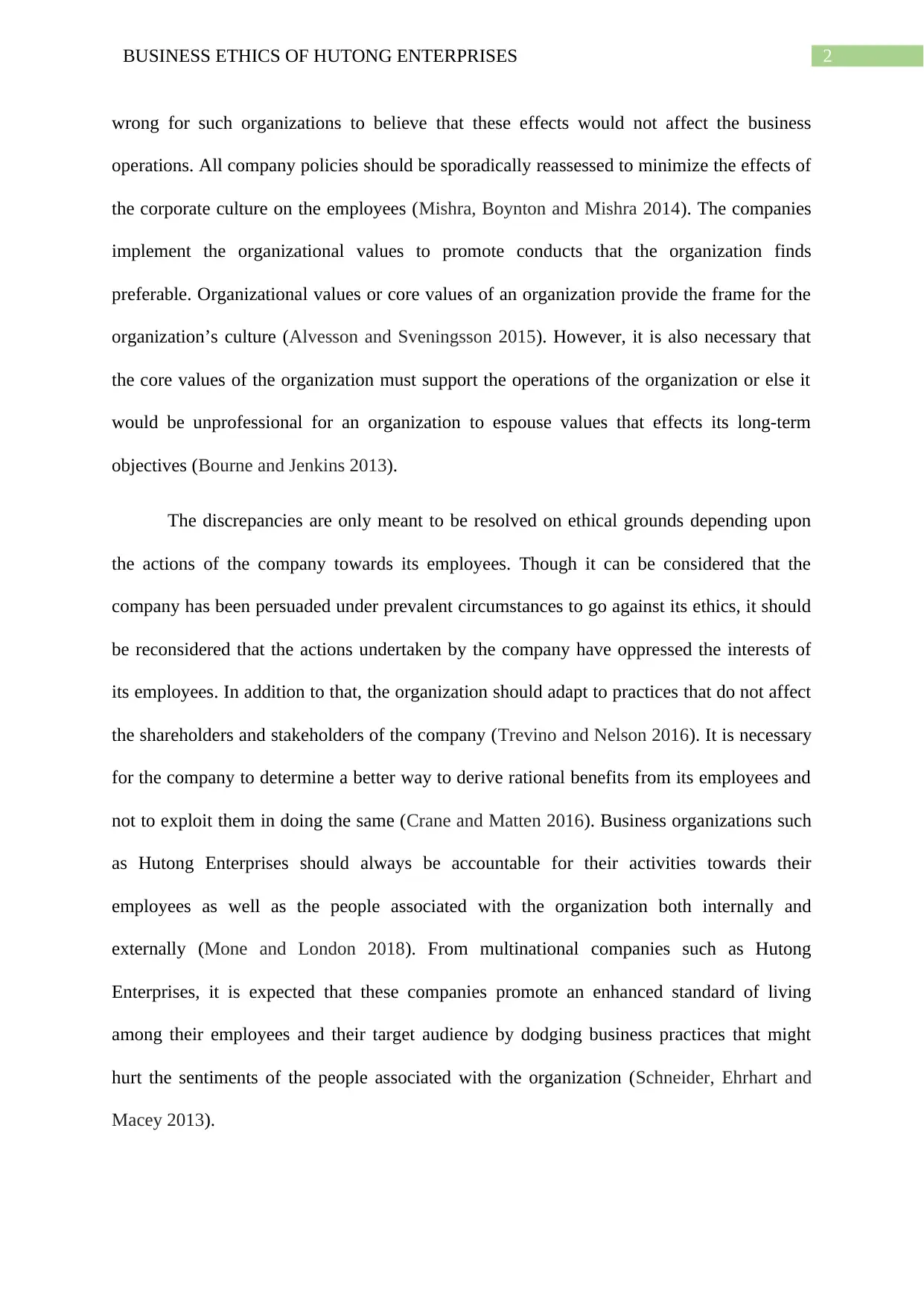
2BUSINESS ETHICS OF HUTONG ENTERPRISES
wrong for such organizations to believe that these effects would not affect the business
operations. All company policies should be sporadically reassessed to minimize the effects of
the corporate culture on the employees (Mishra, Boynton and Mishra 2014). The companies
implement the organizational values to promote conducts that the organization finds
preferable. Organizational values or core values of an organization provide the frame for the
organization’s culture (Alvesson and Sveningsson 2015). However, it is also necessary that
the core values of the organization must support the operations of the organization or else it
would be unprofessional for an organization to espouse values that effects its long-term
objectives (Bourne and Jenkins 2013).
The discrepancies are only meant to be resolved on ethical grounds depending upon
the actions of the company towards its employees. Though it can be considered that the
company has been persuaded under prevalent circumstances to go against its ethics, it should
be reconsidered that the actions undertaken by the company have oppressed the interests of
its employees. In addition to that, the organization should adapt to practices that do not affect
the shareholders and stakeholders of the company (Trevino and Nelson 2016). It is necessary
for the company to determine a better way to derive rational benefits from its employees and
not to exploit them in doing the same (Crane and Matten 2016). Business organizations such
as Hutong Enterprises should always be accountable for their activities towards their
employees as well as the people associated with the organization both internally and
externally (Mone and London 2018). From multinational companies such as Hutong
Enterprises, it is expected that these companies promote an enhanced standard of living
among their employees and their target audience by dodging business practices that might
hurt the sentiments of the people associated with the organization (Schneider, Ehrhart and
Macey 2013).
wrong for such organizations to believe that these effects would not affect the business
operations. All company policies should be sporadically reassessed to minimize the effects of
the corporate culture on the employees (Mishra, Boynton and Mishra 2014). The companies
implement the organizational values to promote conducts that the organization finds
preferable. Organizational values or core values of an organization provide the frame for the
organization’s culture (Alvesson and Sveningsson 2015). However, it is also necessary that
the core values of the organization must support the operations of the organization or else it
would be unprofessional for an organization to espouse values that effects its long-term
objectives (Bourne and Jenkins 2013).
The discrepancies are only meant to be resolved on ethical grounds depending upon
the actions of the company towards its employees. Though it can be considered that the
company has been persuaded under prevalent circumstances to go against its ethics, it should
be reconsidered that the actions undertaken by the company have oppressed the interests of
its employees. In addition to that, the organization should adapt to practices that do not affect
the shareholders and stakeholders of the company (Trevino and Nelson 2016). It is necessary
for the company to determine a better way to derive rational benefits from its employees and
not to exploit them in doing the same (Crane and Matten 2016). Business organizations such
as Hutong Enterprises should always be accountable for their activities towards their
employees as well as the people associated with the organization both internally and
externally (Mone and London 2018). From multinational companies such as Hutong
Enterprises, it is expected that these companies promote an enhanced standard of living
among their employees and their target audience by dodging business practices that might
hurt the sentiments of the people associated with the organization (Schneider, Ehrhart and
Macey 2013).
⊘ This is a preview!⊘
Do you want full access?
Subscribe today to unlock all pages.

Trusted by 1+ million students worldwide
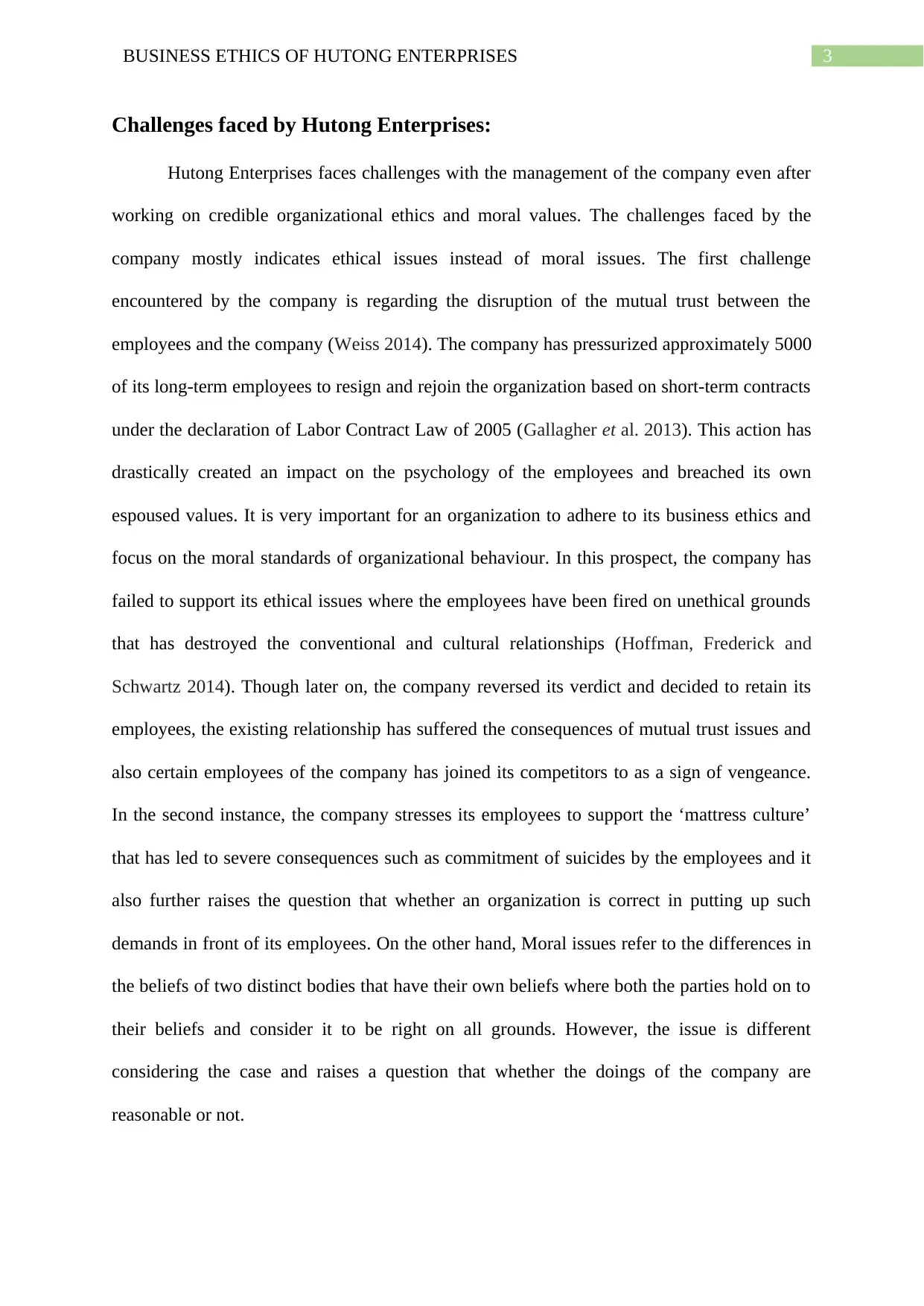
3BUSINESS ETHICS OF HUTONG ENTERPRISES
Challenges faced by Hutong Enterprises:
Hutong Enterprises faces challenges with the management of the company even after
working on credible organizational ethics and moral values. The challenges faced by the
company mostly indicates ethical issues instead of moral issues. The first challenge
encountered by the company is regarding the disruption of the mutual trust between the
employees and the company (Weiss 2014). The company has pressurized approximately 5000
of its long-term employees to resign and rejoin the organization based on short-term contracts
under the declaration of Labor Contract Law of 2005 (Gallagher et al. 2013). This action has
drastically created an impact on the psychology of the employees and breached its own
espoused values. It is very important for an organization to adhere to its business ethics and
focus on the moral standards of organizational behaviour. In this prospect, the company has
failed to support its ethical issues where the employees have been fired on unethical grounds
that has destroyed the conventional and cultural relationships (Hoffman, Frederick and
Schwartz 2014). Though later on, the company reversed its verdict and decided to retain its
employees, the existing relationship has suffered the consequences of mutual trust issues and
also certain employees of the company has joined its competitors to as a sign of vengeance.
In the second instance, the company stresses its employees to support the ‘mattress culture’
that has led to severe consequences such as commitment of suicides by the employees and it
also further raises the question that whether an organization is correct in putting up such
demands in front of its employees. On the other hand, Moral issues refer to the differences in
the beliefs of two distinct bodies that have their own beliefs where both the parties hold on to
their beliefs and consider it to be right on all grounds. However, the issue is different
considering the case and raises a question that whether the doings of the company are
reasonable or not.
Challenges faced by Hutong Enterprises:
Hutong Enterprises faces challenges with the management of the company even after
working on credible organizational ethics and moral values. The challenges faced by the
company mostly indicates ethical issues instead of moral issues. The first challenge
encountered by the company is regarding the disruption of the mutual trust between the
employees and the company (Weiss 2014). The company has pressurized approximately 5000
of its long-term employees to resign and rejoin the organization based on short-term contracts
under the declaration of Labor Contract Law of 2005 (Gallagher et al. 2013). This action has
drastically created an impact on the psychology of the employees and breached its own
espoused values. It is very important for an organization to adhere to its business ethics and
focus on the moral standards of organizational behaviour. In this prospect, the company has
failed to support its ethical issues where the employees have been fired on unethical grounds
that has destroyed the conventional and cultural relationships (Hoffman, Frederick and
Schwartz 2014). Though later on, the company reversed its verdict and decided to retain its
employees, the existing relationship has suffered the consequences of mutual trust issues and
also certain employees of the company has joined its competitors to as a sign of vengeance.
In the second instance, the company stresses its employees to support the ‘mattress culture’
that has led to severe consequences such as commitment of suicides by the employees and it
also further raises the question that whether an organization is correct in putting up such
demands in front of its employees. On the other hand, Moral issues refer to the differences in
the beliefs of two distinct bodies that have their own beliefs where both the parties hold on to
their beliefs and consider it to be right on all grounds. However, the issue is different
considering the case and raises a question that whether the doings of the company are
reasonable or not.
Paraphrase This Document
Need a fresh take? Get an instant paraphrase of this document with our AI Paraphraser
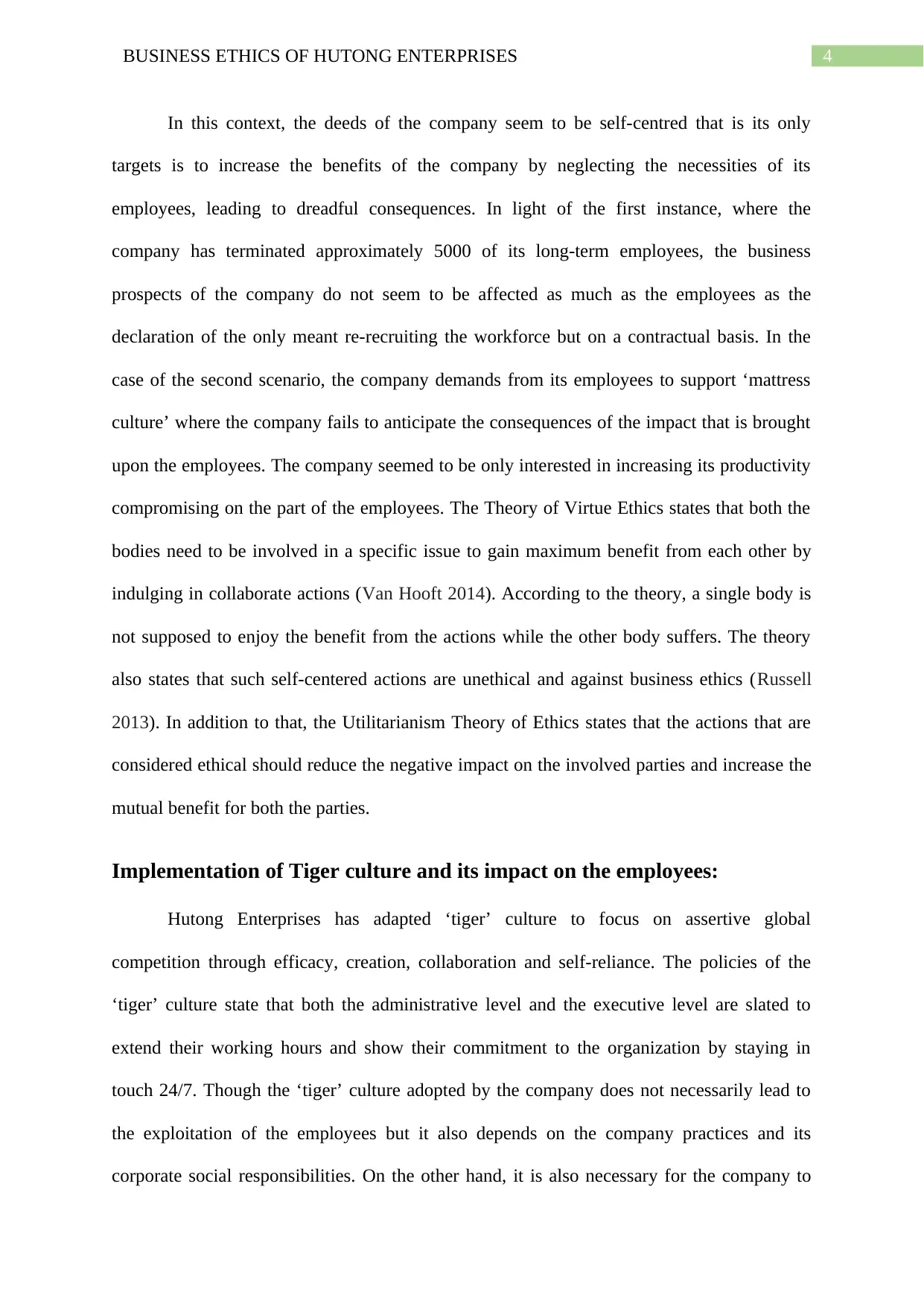
4BUSINESS ETHICS OF HUTONG ENTERPRISES
In this context, the deeds of the company seem to be self-centred that is its only
targets is to increase the benefits of the company by neglecting the necessities of its
employees, leading to dreadful consequences. In light of the first instance, where the
company has terminated approximately 5000 of its long-term employees, the business
prospects of the company do not seem to be affected as much as the employees as the
declaration of the only meant re-recruiting the workforce but on a contractual basis. In the
case of the second scenario, the company demands from its employees to support ‘mattress
culture’ where the company fails to anticipate the consequences of the impact that is brought
upon the employees. The company seemed to be only interested in increasing its productivity
compromising on the part of the employees. The Theory of Virtue Ethics states that both the
bodies need to be involved in a specific issue to gain maximum benefit from each other by
indulging in collaborate actions (Van Hooft 2014). According to the theory, a single body is
not supposed to enjoy the benefit from the actions while the other body suffers. The theory
also states that such self-centered actions are unethical and against business ethics (Russell
2013). In addition to that, the Utilitarianism Theory of Ethics states that the actions that are
considered ethical should reduce the negative impact on the involved parties and increase the
mutual benefit for both the parties.
Implementation of Tiger culture and its impact on the employees:
Hutong Enterprises has adapted ‘tiger’ culture to focus on assertive global
competition through efficacy, creation, collaboration and self-reliance. The policies of the
‘tiger’ culture state that both the administrative level and the executive level are slated to
extend their working hours and show their commitment to the organization by staying in
touch 24/7. Though the ‘tiger’ culture adopted by the company does not necessarily lead to
the exploitation of the employees but it also depends on the company practices and its
corporate social responsibilities. On the other hand, it is also necessary for the company to
In this context, the deeds of the company seem to be self-centred that is its only
targets is to increase the benefits of the company by neglecting the necessities of its
employees, leading to dreadful consequences. In light of the first instance, where the
company has terminated approximately 5000 of its long-term employees, the business
prospects of the company do not seem to be affected as much as the employees as the
declaration of the only meant re-recruiting the workforce but on a contractual basis. In the
case of the second scenario, the company demands from its employees to support ‘mattress
culture’ where the company fails to anticipate the consequences of the impact that is brought
upon the employees. The company seemed to be only interested in increasing its productivity
compromising on the part of the employees. The Theory of Virtue Ethics states that both the
bodies need to be involved in a specific issue to gain maximum benefit from each other by
indulging in collaborate actions (Van Hooft 2014). According to the theory, a single body is
not supposed to enjoy the benefit from the actions while the other body suffers. The theory
also states that such self-centered actions are unethical and against business ethics (Russell
2013). In addition to that, the Utilitarianism Theory of Ethics states that the actions that are
considered ethical should reduce the negative impact on the involved parties and increase the
mutual benefit for both the parties.
Implementation of Tiger culture and its impact on the employees:
Hutong Enterprises has adapted ‘tiger’ culture to focus on assertive global
competition through efficacy, creation, collaboration and self-reliance. The policies of the
‘tiger’ culture state that both the administrative level and the executive level are slated to
extend their working hours and show their commitment to the organization by staying in
touch 24/7. Though the ‘tiger’ culture adopted by the company does not necessarily lead to
the exploitation of the employees but it also depends on the company practices and its
corporate social responsibilities. On the other hand, it is also necessary for the company to
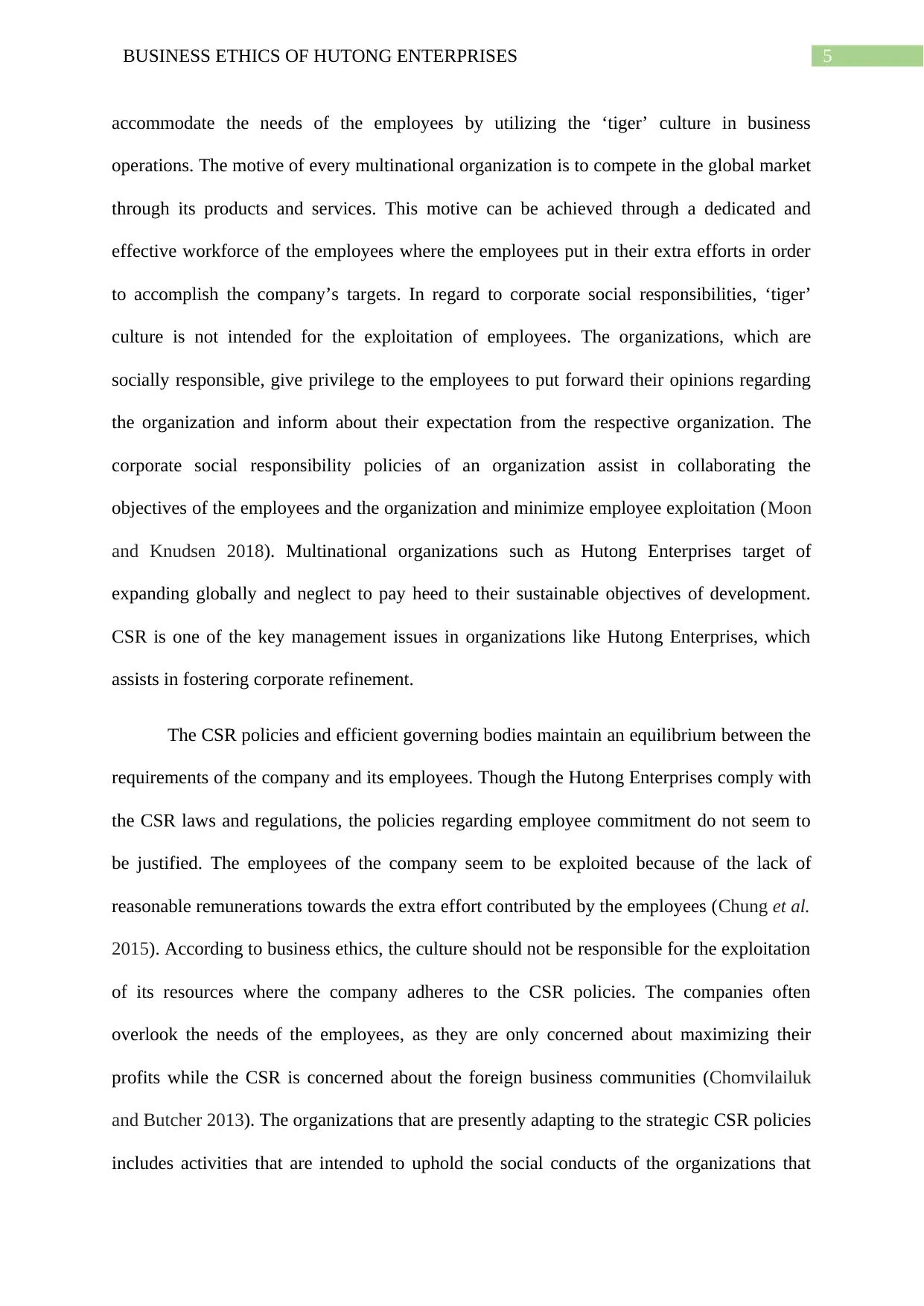
5BUSINESS ETHICS OF HUTONG ENTERPRISES
accommodate the needs of the employees by utilizing the ‘tiger’ culture in business
operations. The motive of every multinational organization is to compete in the global market
through its products and services. This motive can be achieved through a dedicated and
effective workforce of the employees where the employees put in their extra efforts in order
to accomplish the company’s targets. In regard to corporate social responsibilities, ‘tiger’
culture is not intended for the exploitation of employees. The organizations, which are
socially responsible, give privilege to the employees to put forward their opinions regarding
the organization and inform about their expectation from the respective organization. The
corporate social responsibility policies of an organization assist in collaborating the
objectives of the employees and the organization and minimize employee exploitation (Moon
and Knudsen 2018). Multinational organizations such as Hutong Enterprises target of
expanding globally and neglect to pay heed to their sustainable objectives of development.
CSR is one of the key management issues in organizations like Hutong Enterprises, which
assists in fostering corporate refinement.
The CSR policies and efficient governing bodies maintain an equilibrium between the
requirements of the company and its employees. Though the Hutong Enterprises comply with
the CSR laws and regulations, the policies regarding employee commitment do not seem to
be justified. The employees of the company seem to be exploited because of the lack of
reasonable remunerations towards the extra effort contributed by the employees (Chung et al.
2015). According to business ethics, the culture should not be responsible for the exploitation
of its resources where the company adheres to the CSR policies. The companies often
overlook the needs of the employees, as they are only concerned about maximizing their
profits while the CSR is concerned about the foreign business communities (Chomvilailuk
and Butcher 2013). The organizations that are presently adapting to the strategic CSR policies
includes activities that are intended to uphold the social conducts of the organizations that
accommodate the needs of the employees by utilizing the ‘tiger’ culture in business
operations. The motive of every multinational organization is to compete in the global market
through its products and services. This motive can be achieved through a dedicated and
effective workforce of the employees where the employees put in their extra efforts in order
to accomplish the company’s targets. In regard to corporate social responsibilities, ‘tiger’
culture is not intended for the exploitation of employees. The organizations, which are
socially responsible, give privilege to the employees to put forward their opinions regarding
the organization and inform about their expectation from the respective organization. The
corporate social responsibility policies of an organization assist in collaborating the
objectives of the employees and the organization and minimize employee exploitation (Moon
and Knudsen 2018). Multinational organizations such as Hutong Enterprises target of
expanding globally and neglect to pay heed to their sustainable objectives of development.
CSR is one of the key management issues in organizations like Hutong Enterprises, which
assists in fostering corporate refinement.
The CSR policies and efficient governing bodies maintain an equilibrium between the
requirements of the company and its employees. Though the Hutong Enterprises comply with
the CSR laws and regulations, the policies regarding employee commitment do not seem to
be justified. The employees of the company seem to be exploited because of the lack of
reasonable remunerations towards the extra effort contributed by the employees (Chung et al.
2015). According to business ethics, the culture should not be responsible for the exploitation
of its resources where the company adheres to the CSR policies. The companies often
overlook the needs of the employees, as they are only concerned about maximizing their
profits while the CSR is concerned about the foreign business communities (Chomvilailuk
and Butcher 2013). The organizations that are presently adapting to the strategic CSR policies
includes activities that are intended to uphold the social conducts of the organizations that
⊘ This is a preview!⊘
Do you want full access?
Subscribe today to unlock all pages.

Trusted by 1+ million students worldwide
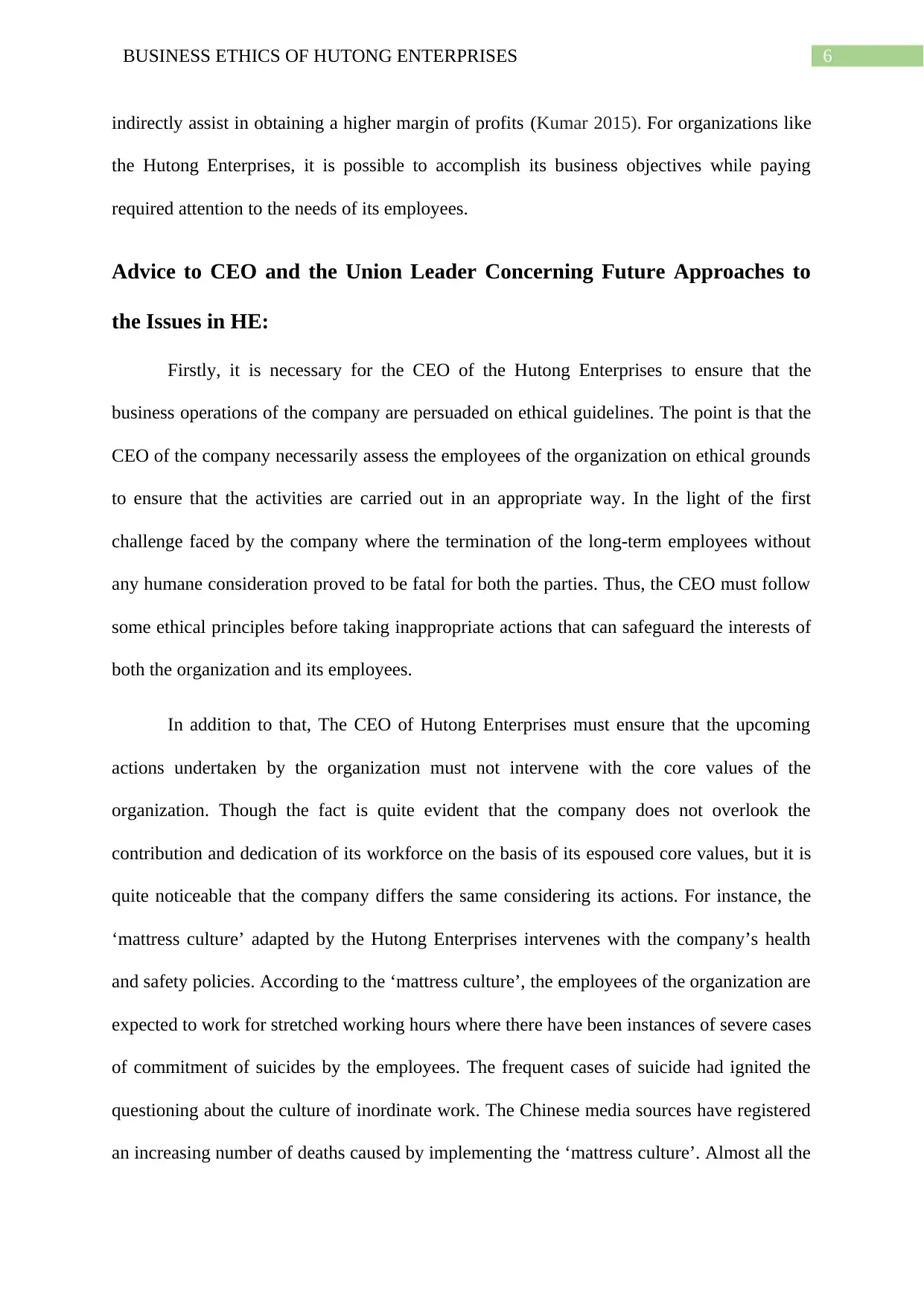
6BUSINESS ETHICS OF HUTONG ENTERPRISES
indirectly assist in obtaining a higher margin of profits (Kumar 2015). For organizations like
the Hutong Enterprises, it is possible to accomplish its business objectives while paying
required attention to the needs of its employees.
Advice to CEO and the Union Leader Concerning Future Approaches to
the Issues in HE:
Firstly, it is necessary for the CEO of the Hutong Enterprises to ensure that the
business operations of the company are persuaded on ethical guidelines. The point is that the
CEO of the company necessarily assess the employees of the organization on ethical grounds
to ensure that the activities are carried out in an appropriate way. In the light of the first
challenge faced by the company where the termination of the long-term employees without
any humane consideration proved to be fatal for both the parties. Thus, the CEO must follow
some ethical principles before taking inappropriate actions that can safeguard the interests of
both the organization and its employees.
In addition to that, The CEO of Hutong Enterprises must ensure that the upcoming
actions undertaken by the organization must not intervene with the core values of the
organization. Though the fact is quite evident that the company does not overlook the
contribution and dedication of its workforce on the basis of its espoused core values, but it is
quite noticeable that the company differs the same considering its actions. For instance, the
‘mattress culture’ adapted by the Hutong Enterprises intervenes with the company’s health
and safety policies. According to the ‘mattress culture’, the employees of the organization are
expected to work for stretched working hours where there have been instances of severe cases
of commitment of suicides by the employees. The frequent cases of suicide had ignited the
questioning about the culture of inordinate work. The Chinese media sources have registered
an increasing number of deaths caused by implementing the ‘mattress culture’. Almost all the
indirectly assist in obtaining a higher margin of profits (Kumar 2015). For organizations like
the Hutong Enterprises, it is possible to accomplish its business objectives while paying
required attention to the needs of its employees.
Advice to CEO and the Union Leader Concerning Future Approaches to
the Issues in HE:
Firstly, it is necessary for the CEO of the Hutong Enterprises to ensure that the
business operations of the company are persuaded on ethical guidelines. The point is that the
CEO of the company necessarily assess the employees of the organization on ethical grounds
to ensure that the activities are carried out in an appropriate way. In the light of the first
challenge faced by the company where the termination of the long-term employees without
any humane consideration proved to be fatal for both the parties. Thus, the CEO must follow
some ethical principles before taking inappropriate actions that can safeguard the interests of
both the organization and its employees.
In addition to that, The CEO of Hutong Enterprises must ensure that the upcoming
actions undertaken by the organization must not intervene with the core values of the
organization. Though the fact is quite evident that the company does not overlook the
contribution and dedication of its workforce on the basis of its espoused core values, but it is
quite noticeable that the company differs the same considering its actions. For instance, the
‘mattress culture’ adapted by the Hutong Enterprises intervenes with the company’s health
and safety policies. According to the ‘mattress culture’, the employees of the organization are
expected to work for stretched working hours where there have been instances of severe cases
of commitment of suicides by the employees. The frequent cases of suicide had ignited the
questioning about the culture of inordinate work. The Chinese media sources have registered
an increasing number of deaths caused by implementing the ‘mattress culture’. Almost all the
Paraphrase This Document
Need a fresh take? Get an instant paraphrase of this document with our AI Paraphraser
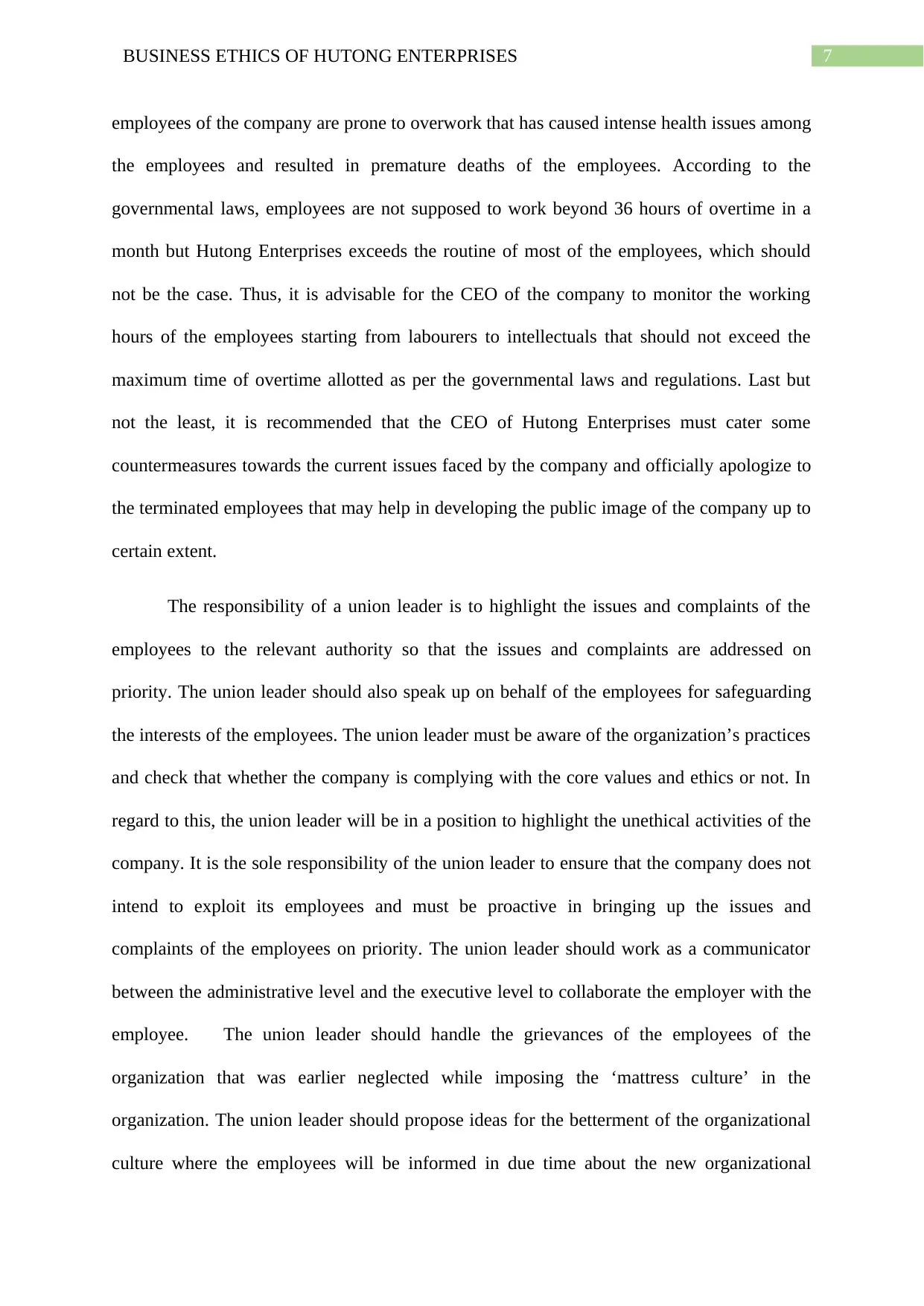
7BUSINESS ETHICS OF HUTONG ENTERPRISES
employees of the company are prone to overwork that has caused intense health issues among
the employees and resulted in premature deaths of the employees. According to the
governmental laws, employees are not supposed to work beyond 36 hours of overtime in a
month but Hutong Enterprises exceeds the routine of most of the employees, which should
not be the case. Thus, it is advisable for the CEO of the company to monitor the working
hours of the employees starting from labourers to intellectuals that should not exceed the
maximum time of overtime allotted as per the governmental laws and regulations. Last but
not the least, it is recommended that the CEO of Hutong Enterprises must cater some
countermeasures towards the current issues faced by the company and officially apologize to
the terminated employees that may help in developing the public image of the company up to
certain extent.
The responsibility of a union leader is to highlight the issues and complaints of the
employees to the relevant authority so that the issues and complaints are addressed on
priority. The union leader should also speak up on behalf of the employees for safeguarding
the interests of the employees. The union leader must be aware of the organization’s practices
and check that whether the company is complying with the core values and ethics or not. In
regard to this, the union leader will be in a position to highlight the unethical activities of the
company. It is the sole responsibility of the union leader to ensure that the company does not
intend to exploit its employees and must be proactive in bringing up the issues and
complaints of the employees on priority. The union leader should work as a communicator
between the administrative level and the executive level to collaborate the employer with the
employee. The union leader should handle the grievances of the employees of the
organization that was earlier neglected while imposing the ‘mattress culture’ in the
organization. The union leader should propose ideas for the betterment of the organizational
culture where the employees will be informed in due time about the new organizational
employees of the company are prone to overwork that has caused intense health issues among
the employees and resulted in premature deaths of the employees. According to the
governmental laws, employees are not supposed to work beyond 36 hours of overtime in a
month but Hutong Enterprises exceeds the routine of most of the employees, which should
not be the case. Thus, it is advisable for the CEO of the company to monitor the working
hours of the employees starting from labourers to intellectuals that should not exceed the
maximum time of overtime allotted as per the governmental laws and regulations. Last but
not the least, it is recommended that the CEO of Hutong Enterprises must cater some
countermeasures towards the current issues faced by the company and officially apologize to
the terminated employees that may help in developing the public image of the company up to
certain extent.
The responsibility of a union leader is to highlight the issues and complaints of the
employees to the relevant authority so that the issues and complaints are addressed on
priority. The union leader should also speak up on behalf of the employees for safeguarding
the interests of the employees. The union leader must be aware of the organization’s practices
and check that whether the company is complying with the core values and ethics or not. In
regard to this, the union leader will be in a position to highlight the unethical activities of the
company. It is the sole responsibility of the union leader to ensure that the company does not
intend to exploit its employees and must be proactive in bringing up the issues and
complaints of the employees on priority. The union leader should work as a communicator
between the administrative level and the executive level to collaborate the employer with the
employee. The union leader should handle the grievances of the employees of the
organization that was earlier neglected while imposing the ‘mattress culture’ in the
organization. The union leader should propose ideas for the betterment of the organizational
culture where the employees will be informed in due time about the new organizational
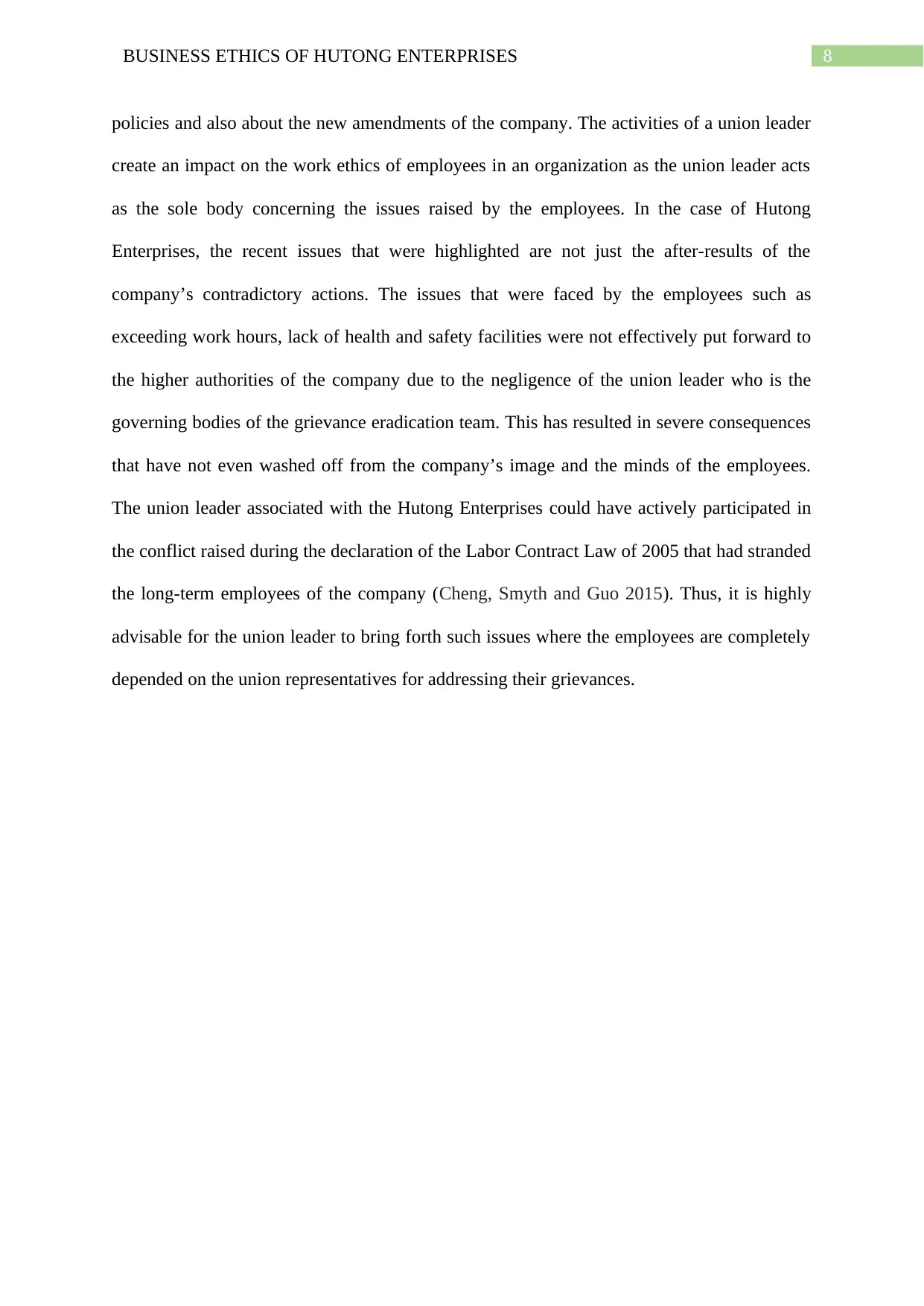
8BUSINESS ETHICS OF HUTONG ENTERPRISES
policies and also about the new amendments of the company. The activities of a union leader
create an impact on the work ethics of employees in an organization as the union leader acts
as the sole body concerning the issues raised by the employees. In the case of Hutong
Enterprises, the recent issues that were highlighted are not just the after-results of the
company’s contradictory actions. The issues that were faced by the employees such as
exceeding work hours, lack of health and safety facilities were not effectively put forward to
the higher authorities of the company due to the negligence of the union leader who is the
governing bodies of the grievance eradication team. This has resulted in severe consequences
that have not even washed off from the company’s image and the minds of the employees.
The union leader associated with the Hutong Enterprises could have actively participated in
the conflict raised during the declaration of the Labor Contract Law of 2005 that had stranded
the long-term employees of the company (Cheng, Smyth and Guo 2015). Thus, it is highly
advisable for the union leader to bring forth such issues where the employees are completely
depended on the union representatives for addressing their grievances.
policies and also about the new amendments of the company. The activities of a union leader
create an impact on the work ethics of employees in an organization as the union leader acts
as the sole body concerning the issues raised by the employees. In the case of Hutong
Enterprises, the recent issues that were highlighted are not just the after-results of the
company’s contradictory actions. The issues that were faced by the employees such as
exceeding work hours, lack of health and safety facilities were not effectively put forward to
the higher authorities of the company due to the negligence of the union leader who is the
governing bodies of the grievance eradication team. This has resulted in severe consequences
that have not even washed off from the company’s image and the minds of the employees.
The union leader associated with the Hutong Enterprises could have actively participated in
the conflict raised during the declaration of the Labor Contract Law of 2005 that had stranded
the long-term employees of the company (Cheng, Smyth and Guo 2015). Thus, it is highly
advisable for the union leader to bring forth such issues where the employees are completely
depended on the union representatives for addressing their grievances.
⊘ This is a preview!⊘
Do you want full access?
Subscribe today to unlock all pages.

Trusted by 1+ million students worldwide
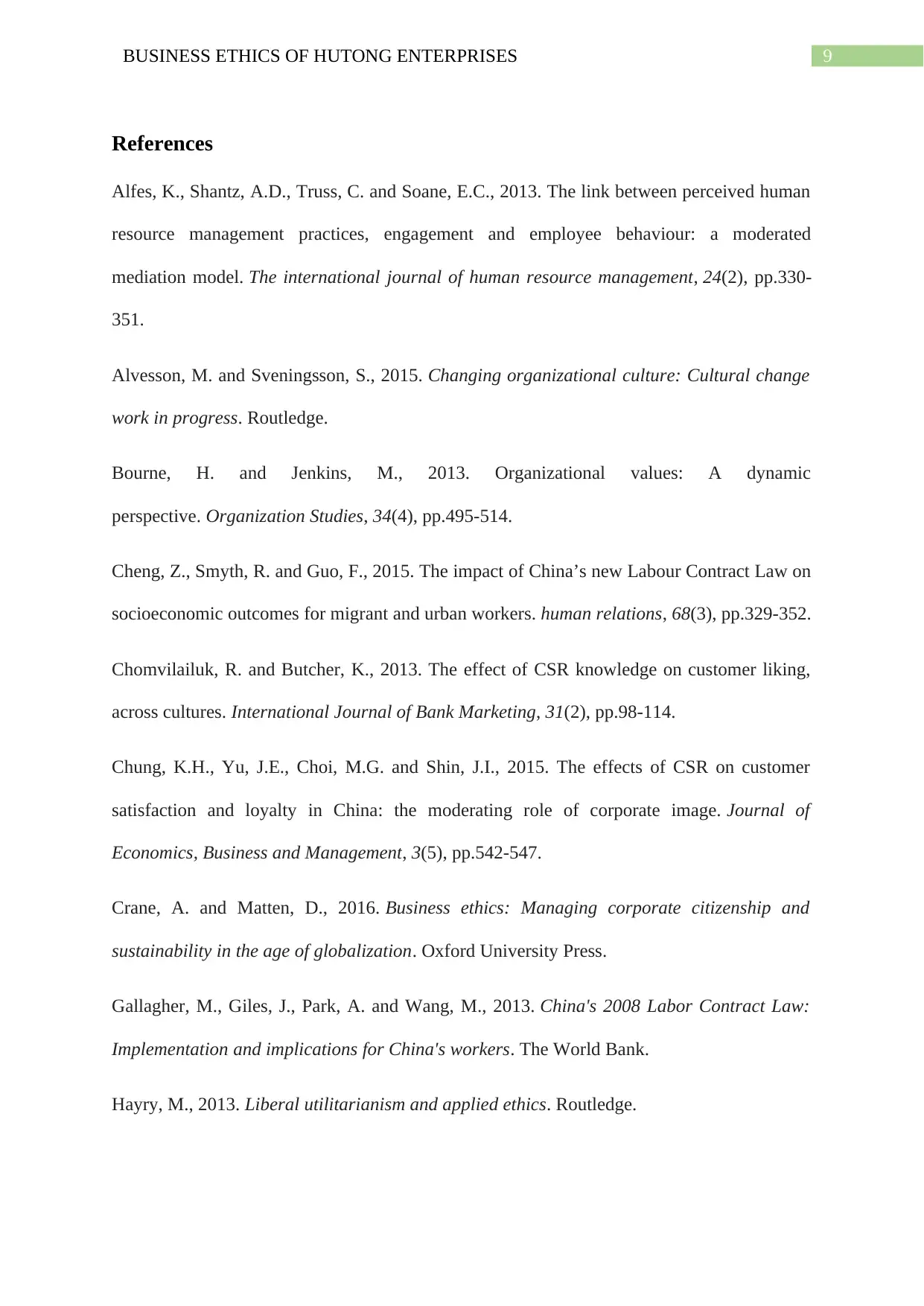
9BUSINESS ETHICS OF HUTONG ENTERPRISES
References
Alfes, K., Shantz, A.D., Truss, C. and Soane, E.C., 2013. The link between perceived human
resource management practices, engagement and employee behaviour: a moderated
mediation model. The international journal of human resource management, 24(2), pp.330-
351.
Alvesson, M. and Sveningsson, S., 2015. Changing organizational culture: Cultural change
work in progress. Routledge.
Bourne, H. and Jenkins, M., 2013. Organizational values: A dynamic
perspective. Organization Studies, 34(4), pp.495-514.
Cheng, Z., Smyth, R. and Guo, F., 2015. The impact of China’s new Labour Contract Law on
socioeconomic outcomes for migrant and urban workers. human relations, 68(3), pp.329-352.
Chomvilailuk, R. and Butcher, K., 2013. The effect of CSR knowledge on customer liking,
across cultures. International Journal of Bank Marketing, 31(2), pp.98-114.
Chung, K.H., Yu, J.E., Choi, M.G. and Shin, J.I., 2015. The effects of CSR on customer
satisfaction and loyalty in China: the moderating role of corporate image. Journal of
Economics, Business and Management, 3(5), pp.542-547.
Crane, A. and Matten, D., 2016. Business ethics: Managing corporate citizenship and
sustainability in the age of globalization. Oxford University Press.
Gallagher, M., Giles, J., Park, A. and Wang, M., 2013. China's 2008 Labor Contract Law:
Implementation and implications for China's workers. The World Bank.
Hayry, M., 2013. Liberal utilitarianism and applied ethics. Routledge.
References
Alfes, K., Shantz, A.D., Truss, C. and Soane, E.C., 2013. The link between perceived human
resource management practices, engagement and employee behaviour: a moderated
mediation model. The international journal of human resource management, 24(2), pp.330-
351.
Alvesson, M. and Sveningsson, S., 2015. Changing organizational culture: Cultural change
work in progress. Routledge.
Bourne, H. and Jenkins, M., 2013. Organizational values: A dynamic
perspective. Organization Studies, 34(4), pp.495-514.
Cheng, Z., Smyth, R. and Guo, F., 2015. The impact of China’s new Labour Contract Law on
socioeconomic outcomes for migrant and urban workers. human relations, 68(3), pp.329-352.
Chomvilailuk, R. and Butcher, K., 2013. The effect of CSR knowledge on customer liking,
across cultures. International Journal of Bank Marketing, 31(2), pp.98-114.
Chung, K.H., Yu, J.E., Choi, M.G. and Shin, J.I., 2015. The effects of CSR on customer
satisfaction and loyalty in China: the moderating role of corporate image. Journal of
Economics, Business and Management, 3(5), pp.542-547.
Crane, A. and Matten, D., 2016. Business ethics: Managing corporate citizenship and
sustainability in the age of globalization. Oxford University Press.
Gallagher, M., Giles, J., Park, A. and Wang, M., 2013. China's 2008 Labor Contract Law:
Implementation and implications for China's workers. The World Bank.
Hayry, M., 2013. Liberal utilitarianism and applied ethics. Routledge.
Paraphrase This Document
Need a fresh take? Get an instant paraphrase of this document with our AI Paraphraser
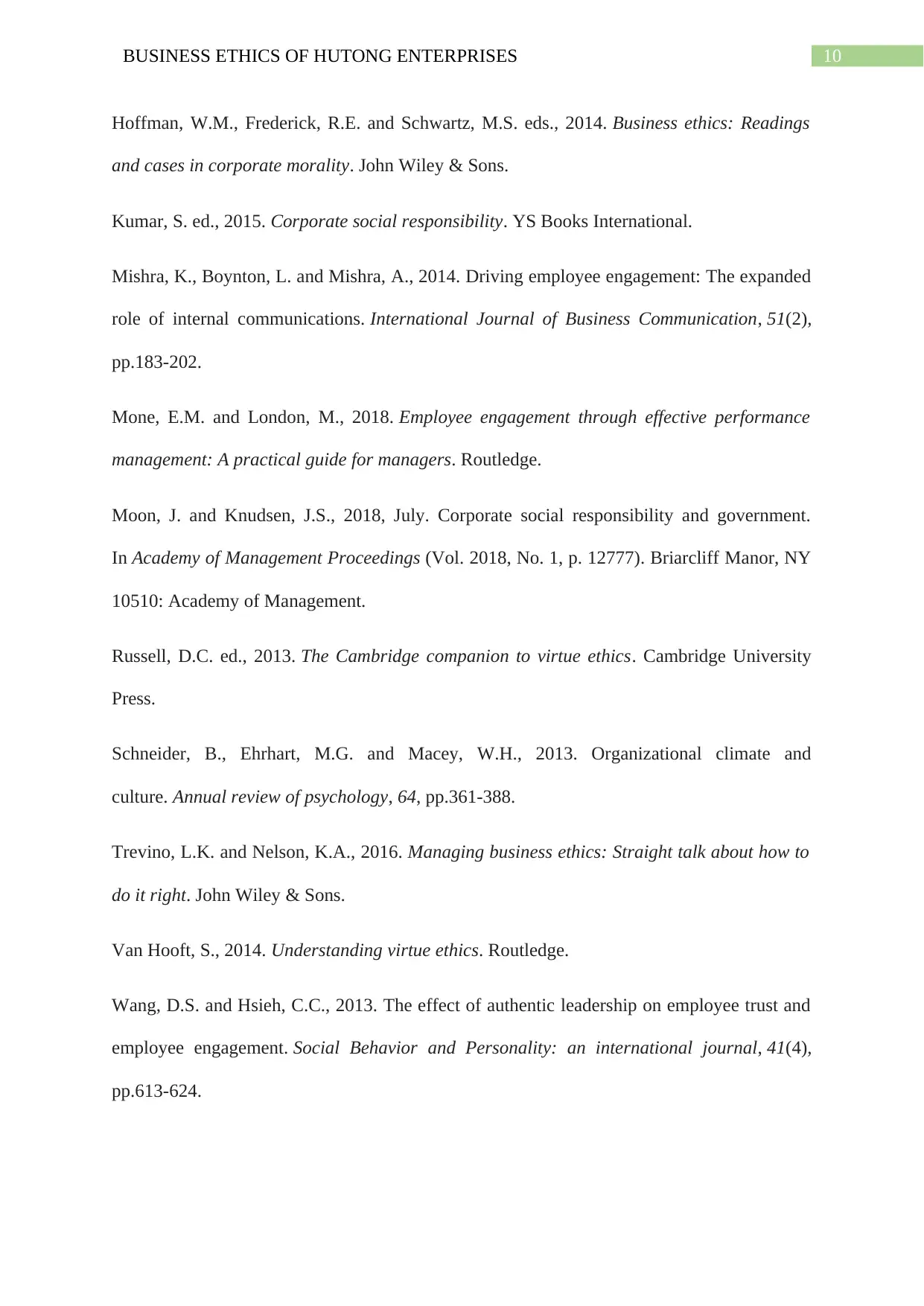
10BUSINESS ETHICS OF HUTONG ENTERPRISES
Hoffman, W.M., Frederick, R.E. and Schwartz, M.S. eds., 2014. Business ethics: Readings
and cases in corporate morality. John Wiley & Sons.
Kumar, S. ed., 2015. Corporate social responsibility. YS Books International.
Mishra, K., Boynton, L. and Mishra, A., 2014. Driving employee engagement: The expanded
role of internal communications. International Journal of Business Communication, 51(2),
pp.183-202.
Mone, E.M. and London, M., 2018. Employee engagement through effective performance
management: A practical guide for managers. Routledge.
Moon, J. and Knudsen, J.S., 2018, July. Corporate social responsibility and government.
In Academy of Management Proceedings (Vol. 2018, No. 1, p. 12777). Briarcliff Manor, NY
10510: Academy of Management.
Russell, D.C. ed., 2013. The Cambridge companion to virtue ethics. Cambridge University
Press.
Schneider, B., Ehrhart, M.G. and Macey, W.H., 2013. Organizational climate and
culture. Annual review of psychology, 64, pp.361-388.
Trevino, L.K. and Nelson, K.A., 2016. Managing business ethics: Straight talk about how to
do it right. John Wiley & Sons.
Van Hooft, S., 2014. Understanding virtue ethics. Routledge.
Wang, D.S. and Hsieh, C.C., 2013. The effect of authentic leadership on employee trust and
employee engagement. Social Behavior and Personality: an international journal, 41(4),
pp.613-624.
Hoffman, W.M., Frederick, R.E. and Schwartz, M.S. eds., 2014. Business ethics: Readings
and cases in corporate morality. John Wiley & Sons.
Kumar, S. ed., 2015. Corporate social responsibility. YS Books International.
Mishra, K., Boynton, L. and Mishra, A., 2014. Driving employee engagement: The expanded
role of internal communications. International Journal of Business Communication, 51(2),
pp.183-202.
Mone, E.M. and London, M., 2018. Employee engagement through effective performance
management: A practical guide for managers. Routledge.
Moon, J. and Knudsen, J.S., 2018, July. Corporate social responsibility and government.
In Academy of Management Proceedings (Vol. 2018, No. 1, p. 12777). Briarcliff Manor, NY
10510: Academy of Management.
Russell, D.C. ed., 2013. The Cambridge companion to virtue ethics. Cambridge University
Press.
Schneider, B., Ehrhart, M.G. and Macey, W.H., 2013. Organizational climate and
culture. Annual review of psychology, 64, pp.361-388.
Trevino, L.K. and Nelson, K.A., 2016. Managing business ethics: Straight talk about how to
do it right. John Wiley & Sons.
Van Hooft, S., 2014. Understanding virtue ethics. Routledge.
Wang, D.S. and Hsieh, C.C., 2013. The effect of authentic leadership on employee trust and
employee engagement. Social Behavior and Personality: an international journal, 41(4),
pp.613-624.
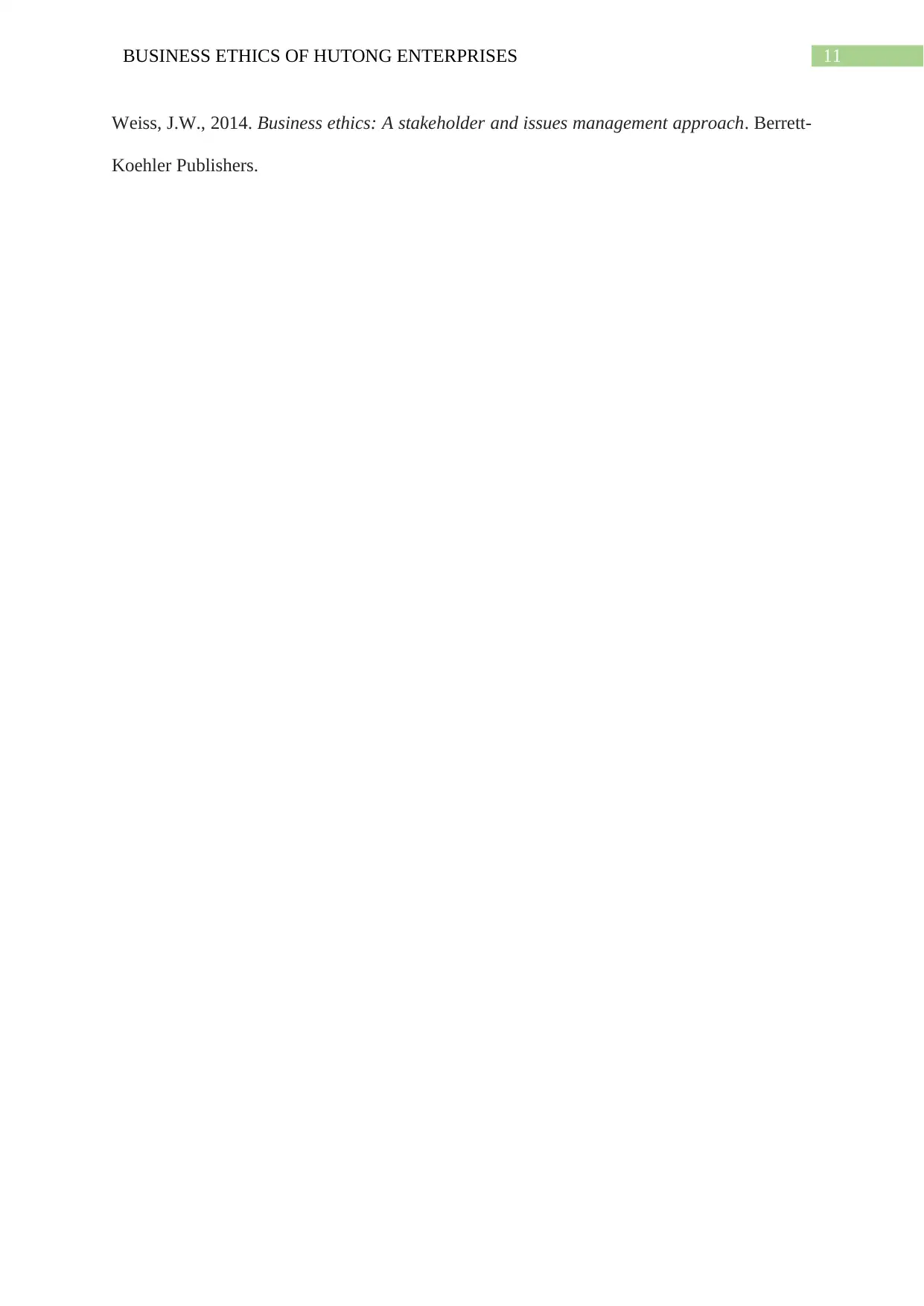
11BUSINESS ETHICS OF HUTONG ENTERPRISES
Weiss, J.W., 2014. Business ethics: A stakeholder and issues management approach. Berrett-
Koehler Publishers.
Weiss, J.W., 2014. Business ethics: A stakeholder and issues management approach. Berrett-
Koehler Publishers.
⊘ This is a preview!⊘
Do you want full access?
Subscribe today to unlock all pages.

Trusted by 1+ million students worldwide
1 out of 12
Related Documents
Your All-in-One AI-Powered Toolkit for Academic Success.
+13062052269
info@desklib.com
Available 24*7 on WhatsApp / Email
![[object Object]](/_next/static/media/star-bottom.7253800d.svg)
Unlock your academic potential
Copyright © 2020–2026 A2Z Services. All Rights Reserved. Developed and managed by ZUCOL.




